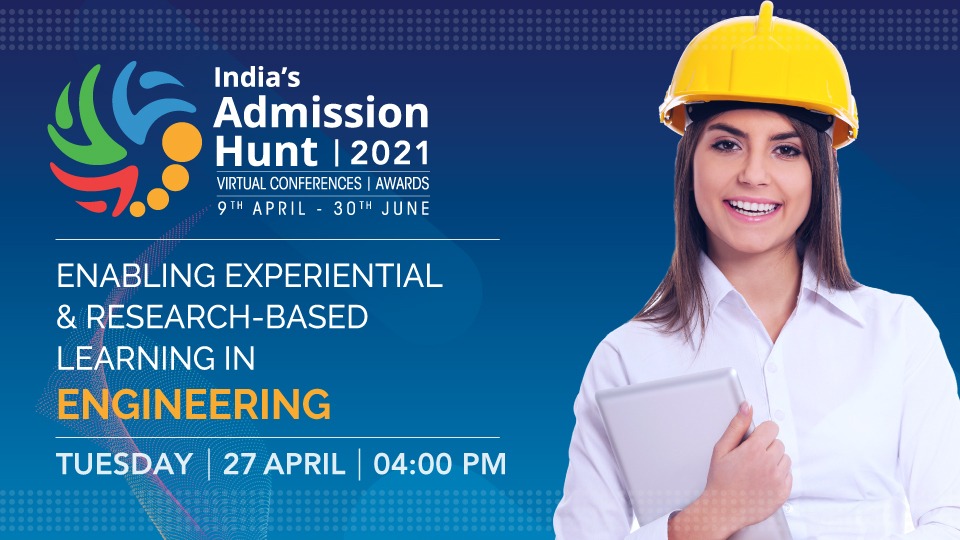Experiential and Research-based Methods in Learning Will Change the Face of Engineering in India, Say Leading Educational Experts
ASMA’s India’s Admission Hunt 2021 session delved into enabling experiential & research-based learning in Engineering
ASMA’s India’s Admission Hunt 2021 recently hosted a webinar on ‘Enabling Experiential & Research-Based Learning in Engineering’. The transformative session talked about implementing research-based learning to foster research competencies for a versatile future workforce.
The current syllabus of engineering studies in India still lags behind in the innovative, thought-provoking, and problem-solving approach. Sometimes, students complain of monotony in learning. How can this problem be resolved? The solution to creating an independent thinker and a multi-tasking worker for the future, learning should be transformed to a more experiential form. A person learns best from experiments and experience.
An esteemed panel of leading experts from the education industry came on ASMA’s platform on 27th April to discuss and elaborate on this topic. The panel was moderated by Rev. Dr. Jose Kannampuzha, Director – Academics, Jyothi Engineering College and comprised of eminent speakers including Dr. A Govardhan, Pro-Vice-Chancellor, Jawaharlal Nehru Technological University Hyderabad, Dr. A. K. Gupta, Executive Director, D. Y. Patil College of Engineering and Technology, Moulshree Dubey, CEO, Professional Institute of Engineering and Technology, Dr. R.S. Chauhan, Director, Jai Parkash Mukand Lal Innovative Engineering & Technology, Prof. Dr. Nihar Walimbe, Principal, Dhole Patil College of Engineering and Dr. Vaishali Patil, Principal, International Institute of Information Technology.
The session started with moderator Rev. Dr. Jose Kannampuzha, Director – Academics, Jyothi Engineering College giving his opening remarks on how the traditional methods need to go and the need to make comparisons with other countries where their workforce is very strong is essential. Only with research oriental learning, we’ll be able to catch up.
Dr. A Govardhan, Pro-Vice-Chancellor, Jawaharlal Nehru Technological University Hyderabad shared his views with the panel and said, “India has changed in the context of the NEP 2020. New paradigms have come into force. We will get the fruit of this policy five years down the line. Latest trends and technologies create more employment opportunities. Whether they are employable is the main question and the second one is how they can tune themselves to survive. Research tempo motivates the students to engage in continuous learning and gain in-depth knowledge about different concepts.”
Dr. A. K. Gupta, Executive Director, D. Y. Patil College of Engineering and Technology talked about the gap between the current industry requirements and the education curriculum in engineering universities. He said, “We are talking about outcome-based education in India. We need to have big R&D departments in institutions just like in the global world. We need to ensure our institutions should be in sync with our industry. We need to change our conventional methods. We need to identify what exactly is research-based learning and the type of audience will decide the type of research.”
Talking about the demerits of engineering education in India Moulshree Dubey, CEO, Professional Institute of Engineering and Technology said, “We are far from designing experiential and research-based learning for our institutions. We are treating engineering students as machines and not students. We need to form the human connection for the revolution in Industry 4.0. We have to ensure project-based learning. Students need to know the application of the knowledge they are gaining in universities.”
Prof. Dr. Nihar Walimbe, Principal, Dhole Patil College of Engineering opined, “At present, many colleges are affiliated with certain universities. This is limiting them against implementing changes and experiential-based learning. Students need not be told everything. They must be subjected to an experimental environment. They must be given the scope for the imagination to solve problems.”
Weighing in on the psychological aspect of learning and teaching Dr. R.S. Chauhan, Director, Jai Parkash Mukand Lal Innovative Engineering & Technology said, “We have to focus on problem-based learning. For developing strategic thinking, psychology is a threshold concept. This proves that transformation is required in education. We need to foster the three H which are- head, heart, and hand. This will boost the confidence of the students. This will help in skill development and crisis management.”
Coming to elaborate on the topic, Dr. Vaishali Patil, Principal, International Institute of Information Technology said, “Experiential learning is not a new concept. It is the heart of any kind of learning. Skilled professionals are going to apply this knowledge to solve problems. This type of learning stretches to all kinds of professions. Students need to learn how to tackle real-life problems. At the pace at which technological advancements are happening, students need to update themselves constantly. They need to put into practice what they have learned before.”
With the revolutionary ideas provided by all the eminent speakers, the session came to a conclusion that if experiential and research-based learning is heavily implemented in India, it will change the scenario of the future workforce, learning, and teaching.




